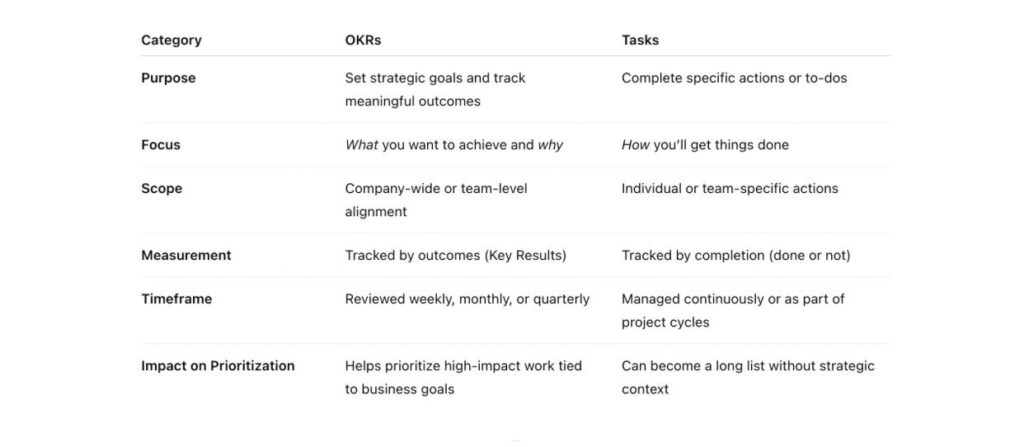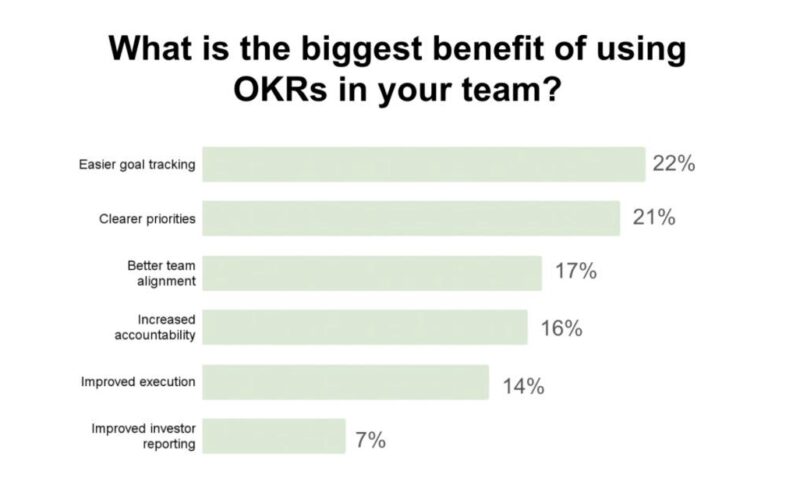When you’re in the earliest days of your startup, your to-do list is endless.
You’re building a product, finding product-market fit, onboarding your first customers, pitching investors – and probably doing all of it with a lean team running at full speed.
In the middle of all this, it might feel like formal goal-setting frameworks are something you can deal with “later.” But if there’s one growth habit worth adopting from the very beginning, it’s OKRs.
Here’s why starting with OKRs from Day 1 can make a massive difference to your startup’s trajectory – and how you can do it without adding complexity or overhead.
What Are OKRs, Really?
OKRs stand for Objectives and Key Results – a goal-setting framework designed to help teams focus on what matters most and measure progress clearly. But at their core, OKRs are really about two things: clarity and alignment.
- An Objective is what you want to achieve. It should be clear, motivating, and direction-setting.
- Key Results are how you’ll measure success. These are specific, trackable outcomes that show whether you’re making real progress.
Here’s a simple example for a small SaaS or service-based startup:
- Objective: Grow our customer base this quarter
- Key Result 1: Increase monthly signups from 200 to 300
- Key Result 2: Improve trial-to-paid conversion rate from 8% to 12%
- Key Result 3: Launch one new referral campaign by end of month two
OKRs aren’t about listing tasks – they’re about setting clear goals and tracking meaningful outcomes. For a small team juggling a lot, OKRs help everyone stay aligned, avoid distractions, and stay focused on progress that actually drives the business forward.
Still not sure how OKRs differ from everyday to-dos? Here’s a quick side-by-side:
OKRs vs. Tasks: What’s the Difference?

Understanding this difference is key – because if you’re only tracking tasks, you may be measuring busyness, not progress. OKRs give your team the structure to prioritize, align, and grow with intention.
So if you’re wondering whether it’s too early to start using OKRs in your startup, here are five reasons to start now, not later:
Why OKRs Are a Startup’s Secret Weapon
1. You Create Clarity When Things Feel Chaotic
In the early stages, it’s easy to chase every opportunity, feature request, or customer idea. But not all of them will move your startup forward.
OKRs force you to ask: What actually matters this quarter? By choosing a few focused objectives and defining what success looks like, you cut through the noise and help your team – no matter how small – stay focused on what’s most important.
Bonus: It also makes it easier to say no to distractions that don’t align with your core goals.
2. You Build a Culture of Focus and Accountability Early
Culture isn’t something you bolt on later – it’s built through the habits and decisions you make from Day 1. OKRs help you embed a culture of ownership, transparency, and accountability into your team before bad habits set in.
- Every team member knows what they’re responsible for.
- Everyone understands how their work ladders up to the bigger picture.
- Weekly check-ins and shared progress create rhythm and accountability.
That kind of alignment is much easier to scale than trying to clean up confusion later.
3. You Align Everyone – Even If “Everyone” Is Just 3 People
Even in a team of three, misalignment happens. One founder is chasing partnerships, another is deep in product, and the third is handling ops and growth. All are busy – but are they working toward the same outcomes?
OKRs ensure everyone’s effort is pointed in the same direction. You define the company objective, then break it into individual key results so everyone knows what winning looks like – individually and as a team.
Research by OKRs Tool found that “better team alignment” is one of the top 5 biggest benefits of using OKRs. That kind of alignment is even more valuable when your resources are tight and every hour counts.
4. You Start Tracking What Actually Works
In the early days, it’s easy to make decisions based on instinct. But as you grow, you need data. OKRs help you build the habit of tracking progress in a structured way from the start.
Instead of just “working hard,” you start measuring outcomes:
- Did this campaign increase signups by 20%?
- Did we reduce churn by the end of the quarter?
- Did our onboarding changes lead to more product activation?
Even if you’re not hitting every target yet, you’re learning what’s effective – and what’s not. That kind of insight is gold for early-stage founders.
5. You Make Your Startup Investor-Ready
If you’re planning to raise funding, having a clear system for setting goals, measuring outcomes, and aligning your team is a strong signal to investors. It shows that you’re serious about growth, disciplined in your execution, and capable of scaling with intention.
Bringing OKRs into your early-stage operations means you’re not just experimenting – you’re learning, optimizing, and moving with purpose. That kind of operational maturity stands out
OKRs Don’t Have to Be Complicated
If OKRs sound like extra overhead, don’t worry – they don’t have to be. In fact, many early-stage teams start by managing OKRs in a simple spreadsheet. The key is to focus on a few goals that actually matter and review them regularly.
As your team grows, using a dedicated OKR tool can make the process smoother and more scalable. These platforms help you set goals, align teams, track progress in real time, and stay focused on outcomes – not just tasks.
But even with the right tools, early-stage teams can run into a few common pitfalls:
- Setting too many OKRs: It’s tempting to tackle everything at once, but that leads to scattered focus. Start with one or two meaningful objectives.
- Treating OKRs like a checklist: OKRs aren’t just a to-do list. They’re about driving impact. Focus on results, not activity.
- Skipping regular check-ins: The value of OKRs is in iteration. Without regular reviews, goals become stale and disconnected from your day-to-day execution.
Avoiding these mistakes will keep your OKRs simple, useful, and tightly connected to your startup’s most important work.
Final Thoughts
The best time to start using OKRs is not “someday” – it’s now.
As a startup founder, you already know how critical focus, speed, and learning are in the early stages. OKRs help you bring structure to the chaos without slowing you down. They give your team a shared sense of direction, align everyone around real outcomes, and build accountability into your culture from the very beginning.
OKRs aren’t about doing more – they’re about doing what matters most. That’s a habit worth building early. The earlier you start, the easier it becomes to scale with clarity and confidence. Instead of constantly reacting, you’re proactively moving toward your vision, one focused quarter at a time.
Whether you’re still in pre-seed or hitting your first million in ARR, OKRs can guide your growth. Start small, be consistent, and don’t wait for perfection. A single, well-defined objective is better than a dozen vague ones.
You don’t need a large team or fancy dashboards – just the discipline to choose your focus and the commitment to track progress. That’s how startups grow with purpose.




